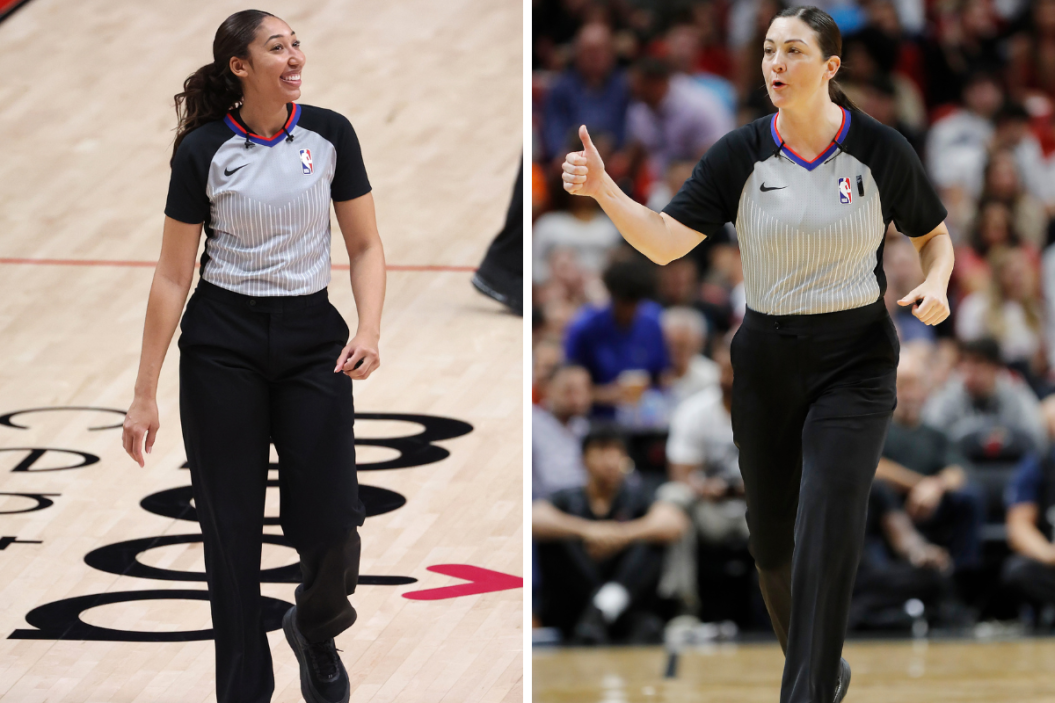Sameness is a word of emphasis when talking about officiating in the NBA. It is imperative refs put biases aside and treat every player and coach the same. The same goes for how coaches and players treat refs.
Videos by FanBuzz
However, who is officiating is what the NBA truly means by the word. Last season, the NBA had 74 full-time officials, and of those 74, eight were women. Those eight were Lauren Holtkamp-Sterling, Natalie Sago, Ashley Moyer-Gleich, Simone Jelks, Jenna Schroeder, Danielle Scott, Cheryl Flores and Dannica Mosher.
The league has had at least one woman referee since 1997 — the first two being Violet Palmer and Dee Kantner — but recently, it's taken steps to grow that number not just for the sake of inclusion, but because they want to find the best people for the job.
"It's really satisfying to say, 'We don't have to go and search for women referees,'" said Monty McCutchen, the NBA's senior vice president, head of referee development and training. "All we have to do is find the best referees — and open our eyes to half of the population."
So, the NBA has quadrupled the number of female refs on their roster over the past 25 years. But, what separated this group of eight from other candidates?
Long weekends working tournaments, watching film, a love for basketball and most importantly, capability.
Female NBA Referees Are Becoming a Normal Part of the Game
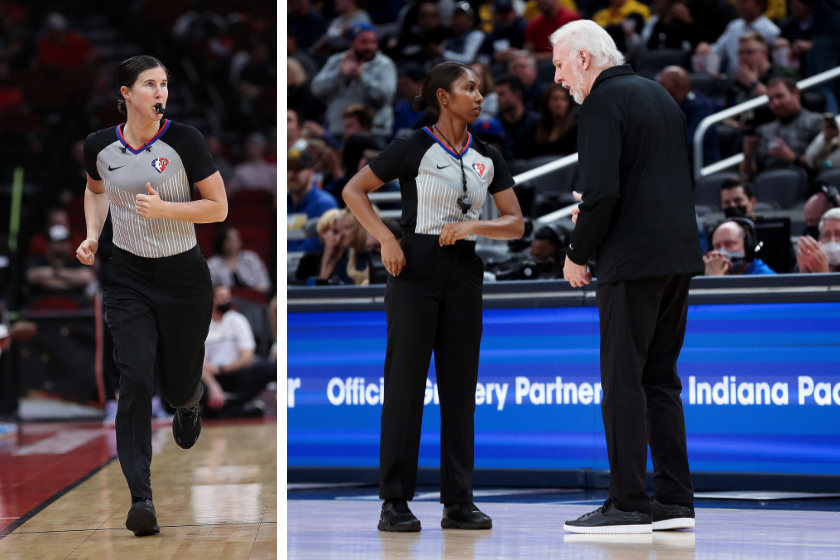
Lauren Holtkamp-Sterling officiates a game on the left, while Simone Jelks talks with Spurs head coach Gregg Popovich during a game. Bob Levey/Getty Images (left), Dylan Buell/Getty Images (right)
RELATED: How Much Do NBA Referees Make?
First, let's meet the group.
Lauren Holtkamp-Sterling is the longest-tenured ref of the group, having begun her NBA career in 2016. Before that, she reffed various high-level NCAA basketball games in the ACC, Big Ten, Big 12, Big East and Colonial Athletic Conference before moving to the NBA G-League. Her six years in the G-League propelled her to the big stage. Her husband, Jonathan Sterling, is also an NBA referee.
Natalie Sago has reffing in her blood. Her father was a high school basketball and college ref, and she spent a lot of her early days traveling with him. She got her professional start in the WNBA, which was a big deal for her because she grew up idolizing players such as Candace Parker and Diana Taurasi.
Ashley Moyer-Gleich has been a hooper her whole life. She played through college and worked her way up the high school, college, G-League and WNBA ranks before becoming a full-time NBA official in 2020. She spends most of her free time digesting film or talking with her coworkers about ways to improve her craft when she's not spending time with her family.
Simone Jelks quickly rose through the referee world after her playing days at USC. She officiated in the G-League and collegiately in the Mid-American and Horizon Leagues before becoming a full-time referee in the NBA two seasons ago.
Jenna Schroeder was casually reffing AAU games when she realized she could make a career as a zebra. She ground her way to the world's best basketball league by working and working and working — putting in seven-day work weeks during a six-month span at one point.
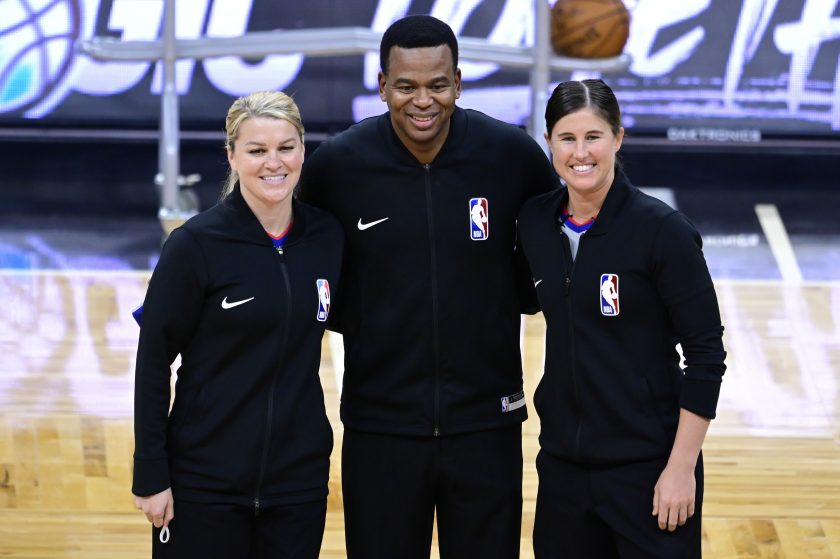
Natalie Sago and Jenna Schroeder pose with Sean Wright before officiating a game together on January 25, 2021. It marked the first time in NBA history two women were officiating in the same game. (Photo by Douglas P. DeFelice/Getty Images)
Danielle Scott worked her way up through the G-Leauge and WNBA much like her colleagues. At 31, Scott has loads of experience at all levels of basketball and looks to be a staple in the NBA for a long time.
The NBA added two more women in October 2022, bringing the total number of female referees to eight. Those women are Cheryl Flores and Dannica Mosher, who were both promoted to full-time status.
Cheryl Flores refereed 12 regular season games during the 2021-22 NBA season. She previously worked 10 seasons in the WNBA and nine seasons in the NBA G-League. She also has 13 years of officiating experience in college basketball and referred in the 2021 Women's National Championship Game.
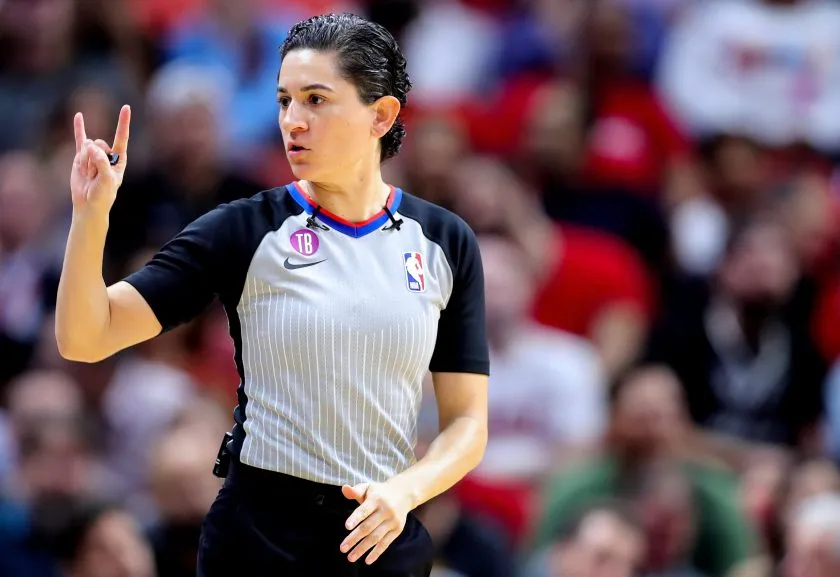
Cheryl Flores looks on during a game between the Detroit Pistons and Miami Heat at FTX Arena on December 06, 2022 in Miami, Florida. (Photo by Megan Briggs/Getty Images)
Like Flores, Dannica Mosher refereed 12 regular season games last NBA season as well. She's also officiated five seasons in the NBA G-League and four in the WNBA. She also worked the WNBA Finals.
As you can see, each woman's path to the NBA isn't abnormal to that of a male referee. However, women referees face different kinds of scrutiny than their male counterparts. For example, female officials are called "too sensitive" if they make a lot of calls, particularly when players show a lot of emotion that can be seen as "part of the game". Despite this, Jelks says that players and coaches must be held to the same standard across the board even if she as a ref may be criticized.
"And if it were male officials, you wouldn't call them sensitive," she said.
You would probably just call them bad at their job, which is the whole point.
Women referees are more criticized for being a woman than their actual skills. But, this group of eight is proof the tides are changing. Don't be surprised when the number of eight continues to increase. As of last March, 42% of NBA G-League refs were women. Seeing how all eight of the full-time NBA female referees made a stop in the G-League before getting called up to the show, we're on the cusp of several more joining the party.
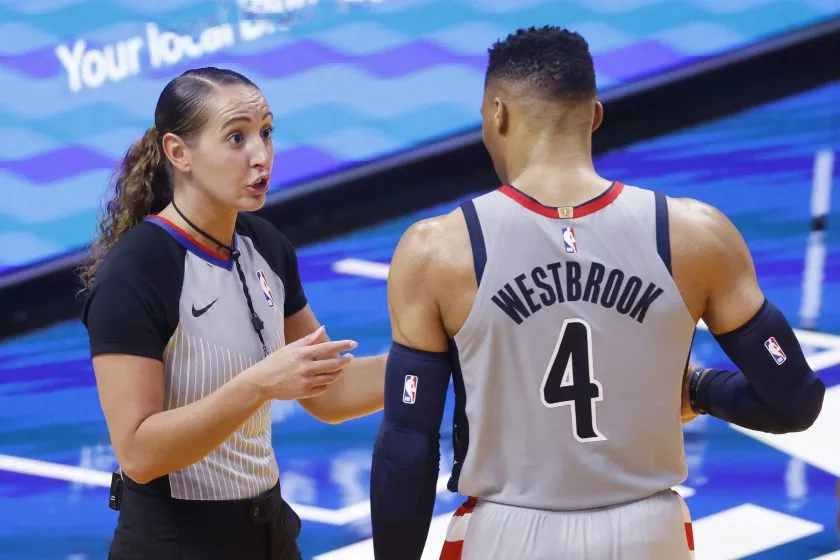
Ashley Moyer-Gleich talks with Russell Westbrook during a game on February 5, 2021. (Photo by Michael Reaves/Getty Images)
"I feel like women, especially women in male-dominated industries, always in the back of our heads, there's a little space, no matter how well we are doing, like 'Am I good enough?' and the answer will always be yes," Jelks said.
The important thing to note, however, is that they're getting these opportunities because they're proving themselves on the court — not to check some box. The best person for the job is the best person for the job. That's it.
